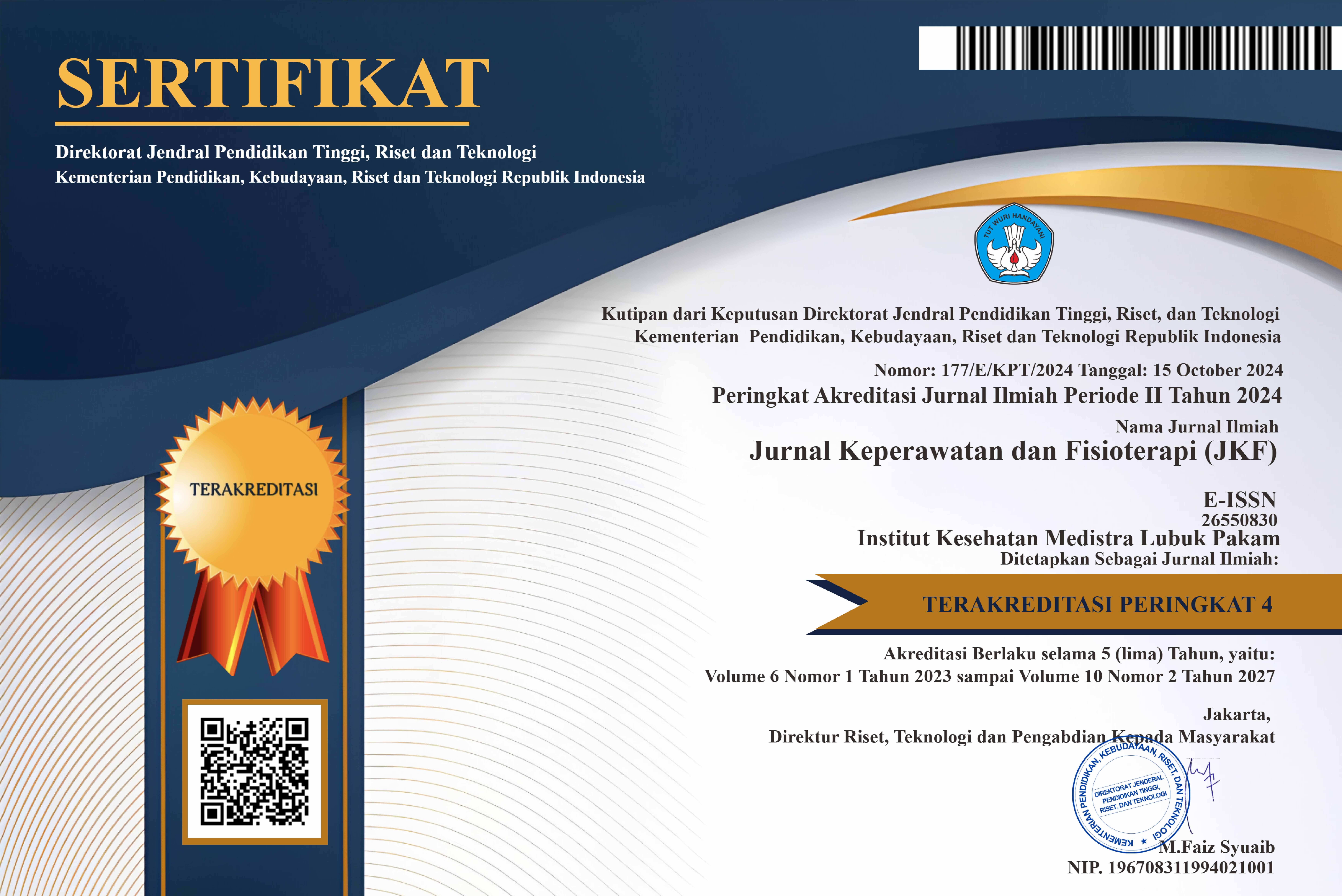Eldearly Preparedness In Faces Of Tornado Disaster In The District Sitinjo
DOI:
https://doi.org/10.35451/jkf.v5i2.1686Keywords:
Tornado Preparedness, Tornado, ElderlyAbstract
A Tornado is a strong wind or it can also be called a big, very strong storm with a whirlwind at a certain speed. Disasters cannot be predicted at any time and can occur. The need for disaster preparedness to prevent the risk of human casualties, material losses, environmental damage and psychological impacts that threaten and disrupt people's lives and livelihoods. Elderly is a group that is very at risk before, during and after a disaster occurs, because the elderly have many chronic diseases, functional decline, cognitive impairment, dementia, and physical limitations. Preparedness is an action taken in anticipation of a disaster to ensure that the actions taken can be. This research is a quantitative study using the research design "cross sectional". This research was conducted to determine the preparedness and factors related to the preparedness of the elderly in facing the tornado disaster in Sitinjo Village, Sitinjo District, Dairi Regency in 2021. The population in this study were 70 elderly people in the work area of Sitinjo District, the sampling technique was stratified random sampling and met the inclusion criteria. The results of the study obtained the majority of respondents in the elderly, low education, female gender, lack of knowledge, have a positive attitude toward disaster preparedness of the Tornado wind, have experienced the Tornado disaster, are not prepared for the Tornado wind disaster. The results of chi square statistical test showed that there is no relationship between age, gender and the preparedness of the elderly in the face of Tornado disaster. There is a relationship between education p-value 0.022, knowledge p-value 0.01, attitude p-value 0.002, and experience p-value 0.021 with the preparedness for the cyclone disaster. It is hoped that the elderly can increase the knowledge and preparedness for the putting wind disaster by participating in socialization, training and conducting disaster simulations and it is necessary to coordinate with the relevant Dairi Regency BPBD to conduct socialization and mitigation of Tornado wind disaster preparedness
Downloads
References
Badan Nasional Penanggulangan Bencana (2017). Informasi Bencana Bulanan Teraktual.
BNPB. Buku Saku Tanggap Tangkas Tangguh Menghadapi Bencana. Badan Nasional Penanggulangan Bencana. Jakarta; 2017. 62 p
Badan Nasional Penanggulangan Bencana. (2020). Daftar Bencana Informasi Indonesia (Dibi). Jakarta:BNPB.
Cutter SL, Tiefenbacher J, Solecki WD. EnGendered Fears: Femininity and Technological Risk Perception. SAGE Journals. 1992;(6):5–22.
Cvetković VM, Roder G, Öcal A, Tarolli P, Dragićević S. The role of gender in preparedness and response behaviors towards flood risk in Serbia. International Journal of Environmental Research and Public Health. 2018;15(12).
O’Neill E, Brereton F, Shahumyan H, Clinch JP. The Impact of Perceived Flood Exposure on Flood-Risk Perception: The Role of Distance. Risk Analysis an International Journal. 2016;36:2158–86.
Jannah, I., & Aini, N. (N.D.). Analisa Kesiapsiagaan Lansia Menghadapi Bencana. Jurnal Kesehatan Kebidanan. Vol. 10. No.02
Murwanto, H., & Purwanta, J. (2021). Kesiapsiagaan Desa Joho Kecamatan Prambanan dalam Menghadapi Bencana Angin. 4–5.
Notoatmodjo, S. (2010). Metodologi Penelitian Kesehatan. Jakarta: Rineka Cipta.
Nugroho. (2015). Preparedness Assessment Tools For Indonesia. Jakarta: Humanitarian Forum Indonesia & MDM
Onwuemele. (2018). Public perception of flood risks and disaster preparedness in lagos megacity, Nigeria. Academic Journal of Interdisciplinary Studies, 7(3), 179–85.
Ramdan Afrian dan Zukya Rona Islami. (2018). Kajian Kesiapsiagaan Menghadapi Bencana Hidrometeorologi pada Masyarakat dan Pemerintah Kota Langsa. Jurnal Pendidikan Geosfer Vol III Nomor 1, 1-7.
Rini, I., S., Niko Dima Kristianingrum, R. W. (2019). Relationship Between Level Of Disaster Knowledge And Attitude Of Landslide Disaster Preparedness In Volunteers "Kelurahan Tangguh” In Malang City. Jurnal Ilmu Keperawatan, 7(2).
Saputri I,Faizal Muslim.,(2022) Kajian Kesiapsiagaan Menghadapi Bencana Covid-19 di Rumah sakir Umum daerah(RSUD) H.Abdul Manan Simatupang Kisaran Tahun 2022
Supriandi, S. (2020). Faktor-Faktor Yang Berhubungan Dengan Kesiapsiagaan Keluarga Dalam Menghadapi Bencana Di Kota Palangka Raya. Avicenna : Journal of Health Research, 3(1), 28–41. https://doi.org/10.36419/avicenna.v3i1.340
Suwarningsih, S., Nurwidiasmara, L., & Mujahidah, Z. (2019). Lansia Dalam Menghadapi Bencana Di Kota Bogor. Jurnal Ilmiah Kesehatan, 11(2), 134–146. https://doi.org/10.37012/jik.v11i2.78
Wijaya, S. A., Wulandari, Y., & Lestari, R. I. (2019). Jurnal Keperawatan Muhammadiyah. 4(1).
Zhu, X., & Sun, B. (n.d.). Study on earthquake risk reduction from the perspectives of the el_derly. Safety Science,2019. https://doi.org/org/10.1016/j.ssci.2016.08.028
Downloads
Published
Issue
Section
License
Copyright in each article is the property of the Author.


























